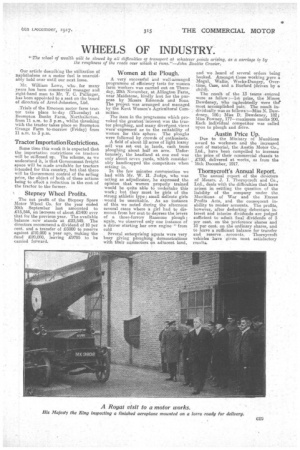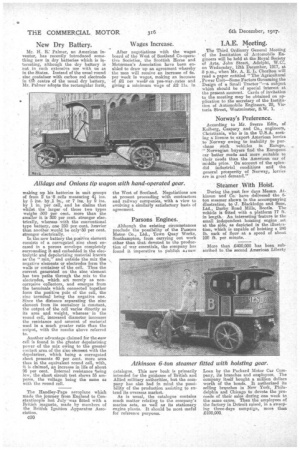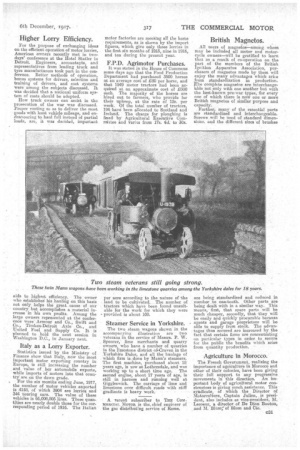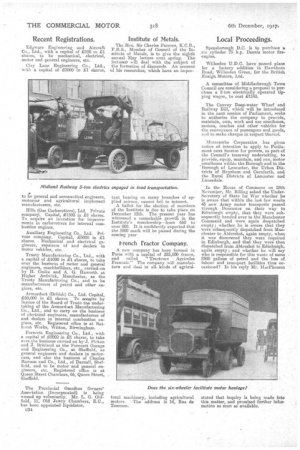WHEELS OF INDUSTRY.
Page 9

Page 10

Page 11

Page 14

If you've noticed an error in this article please click here to report it so we can fix it.
"The wheel of wealth will be slowed by all difficulties of transport at whatever points arising, as a carriage is by the roughness of the roads over which it runs. "—John Beattie Crozier.
Our article describing the utilization of naphthalene as a motor fuel is unavoidably held over until our next issue.
Mr. William Lowe, who . for many years has been commercial manager and right-hand man to Mr. T. G. Pullinger, has been appointed to a seat on the board of directors of Arrol-Johnston, Ltd.
.Trials of the Emerson motor farm tractor take place to-day (Thursday) at Brompton Banks Farm, Northallerton, from 11 a.m. to 3 p.m. whilst threshing with the tractor takes place on Bromptan Grange Farm to-morrow (Friday) from 11 a.m. to 3 p.m.
Tractor Importation Restrictions.
Some time this week it is expected that the importation restrictions on tractors will be stiffened up. The scheme, as we understand it, is that Government freight apace will he made available for tractors intended for this country, but that there will be Government control of the selling price, the object of both of these actions being to effect a reduction in the cost of the tractor to the farmer.
Stepney Wheel Profits.
The net Profit of the Stepney Spare Motor Wheel Co. for the year ended 30th September last amounted to £15,544, an increase of about £1400 over that for the previous year. The available balance .now stands at £23,549. The directors recommend a dividend of 10 per cent, and a transfer of £5000 to reserve against £10,000 a year ago, making the fund £20,000, leaving £9795 to be carried forward.
Women at the Plough.
A very successful "and well-arranged programme of efficiency tests for women farm workers was carried out on Thursday, 29th November, at Allington Farm, near Maidstone, kindly lent for the purpose by Messrs Edmonds and Sons. The project was arranged and managed by the Kent Women's Agricultural Com mittee. • The item in the programme which provoked the greatest'interest was the tractor ploughing, and many divefgent views were 'expressed as to the suitability of women for this sphere. The ploughs were followed by crowds of enthusiasts. A field of about 12 acres of light loamy soil was set out in lands, each team ploughing about half an acre. Unfortunately?, the headland at one end was only about seven yards, which considerably handicapped the competitors when setting in. In the few minutes conversation we had with Mr. W. H. Judge, who was acting as adjudicator., he expressed the opinion that women properly trained would be quite able to undertake this work; but they must be girls of the strong athletic type; small delicate girls would be unsuitable. As an instance of this we noted during the afternoon several cases where a girl had to dismount from her seat to depress the levers of a three-furrow Ransome plough; again, we observed only one instance of a driver starting her own engine" from cold Several enterprising agents, were very busy giving ploughing demonstrations with their aarnnotors on adiacent land,
and we heard of several orders being booked. Amongst those working were a Mogul, Wallis, Weeks=Dungey, Overtime, Case, and a Burford (driven by a child).
The result of the 13 teams entered were as follow :-1.st prize, the Misses Dewdeney, who undoubteolly were the most accomplished pair. The result individually was as follows :—Mis.s N. Dew. chancy, 186; Miss D. Dewdeney, 182; Miss Powney, 177—maximum marks 200. Each individual competitor was called upon to plough and drive.
Austin Price Up.
Due to the Ministry of Munitions award to workmen and the increased cost of material, the Austin Motor Co., Ltd., have been compelled to increase the price of their commercial chassis to £750, delivered at works, as from the 16th December, 1917.
Thornycroft's Annual Report.
The annual report of the directors of Messrs. J. I. Thornycroft and Co., Ltd., deals with the difficulties that have arisen in settling the question of the liability of the company under the Munitions of War and the Excess Profits Acts, and the consequent inability to render accounts. The profits, however, after deducting debenture interest and interim dividends are judged sufficient to admit final dividends of 3 per cent, on the preference shares and 10 per cent, on the ordinary shares, and to leave a sufficient balance for transfer and reserve , accounts. • Thornycroft vehicles have given most satisfactory resul L.
New Dry Battery.
Mr. H. R: Palmer, an American inventor, has recently introduced something new in dry batteries which is interesting, although the dry battery is not in such extensive use with us as in the States. Listead of the usual round zinc container with carbon rod electrode in th% centre of the usual dry battery, Mr. Palmer adopts the rectangular form,
making up his batteries in unit groups of from 2 to '8 cells measuring 4 ins. by 5 ins. by sl in., or 7 ins, by 9 ins. by 1 in. per cell, and he claims that whilst the larger of these two types weighs 600 per cent. more than the smaller it is.300 per cent, stronger electrically, whereas with the conventional type battery, one 250 per cent. heavier than another would be only,50 per cent.
stronger electrically. • In the new battery the posiSive element consists of a corrugated zinc sheet encased in a porous envelope completely surrounding it and embedded in the electrolytic and depolarizing material known as' the "mix,' and outside the mix the negative elements or electrodes form the walls or container of the cell. Thus the current generated on the zinc 'element has two paths through the mix to the electrodes, which act merely as noncorrosive collectors, and emerges from the terminal e which connected together form the positive pole of the cell, the zinc terminal being the negative one. Since the distance separating the zinc element from its container is constant, the output of the cell varies directly as its area and weight, whereas in the round cell: increased diameter increases the resistance and Amount of material used in a much greater ratio than the output, with the results above referred to.
Another advantage claimed for theriew cell is found in the greater depolarizing power of the mix owing to the greater contact area of the zinc element, with the depolarizer, which being a corrugated sheetpresents 40 per cent. more area i than n the equivalent round cell, with, it is claimed, an increase in life of about 96 per cent. Internal resistance 'being low, the short circuit test shows 55 amperes, the voltage being the same as with the round cell The Handley-Page aeroplane which made the journey from England to Constantinople last July' was fitted with a British magneto, made by members of the British Ignition Apparatus Association.
C30
Wages Increase.
After negotiations with the wages board of the West of Scotland Co-operative Societies, the Scottish Horse and Motormen's Association have been enabled to draw up an agreement whereby the men will receive an increase of 6s. per week in wages, making an increase of £1 Per week, on pre-war ,rates and giving a minimum wage of £2 us. in
the West of Scotland. Negotiations are at present proceeding with contractors and railway companies, with a view to evolving a similarly satisfactory basis of agreement.
Parsons Engines.
Although the existing circumstances preclude the possibility of the Parsons Motor Co., Ltd., Town Quay Works, Southampton, from carrying out work other than that devoted to the production of war essentials, the company has found it imperative to publish tis new catalogue. This new book is primarily intended for the guidance of British and Allied military authorities, but the company has also had in mind the possibility of the production a,ssisting to extend its overseas market.
As is usual, the catalogue contains much matter relating to the company's marine sets, as well as its stationary engine plants. It should be most useful for reference purposes.
I.A.E. Meeting.
The Third Ordinary General Meeting of the Institution of Automobile En gin ears will be held at the Royal Society of 'Arts, John Street, Adelplii' W.CS, on Wednesday, 12th December, 1917, at 8 p.m., when Mr. A. E. L. Chorlton will read a paper entitled "The Agricultural . Power Unit—Some Factors Governing the Design of a Small Tractor "—a subject which should be of special interest at the present moment. Cards of invitation to the meeting may be obtained on application to the secretary of the Institution of Automobile Engineers, 28, Victoria Street, Westminster, S.W. 1. .
Norway's Preference.
According to Mr. Sverre Edin, of Kolberg, Caspary and Co., engineers, Christiania, who is in the U.S.A. seeking a licence to export American lorries to Norway owing to inability to purchase such vehicles in Europe, "Norwegian buyers find the European car better made and more suitable to their needs than the American car of middle price. On account of the splendid industrial conditions and the general prosperity of Norway, lorries are in great demand."
Steamer With Hoist.
During the past few days Messrs. Atkinson and Co. have delivered the 6: ton steamer shown in the accompanying illustration, to J. Blackledge and Sons, Ltd., Derby. Road Mills, Bootle. The vehicle is fitted with a platform 17 ft. in length. An interesting 'feature is the small independent hoisting engine set at the side, as depicted in the illustration, which is capable of hoisting a 240 lb. sack of flour at a speed of about 100 ft. per minute.
More than £400,000 has been subscribed to the second American Liberty
Loan by the Packard Motor Car Company, its branches and employees. The company itself bought a million dollars worth of the bonds. It authorized its selling branches in New York, Philadelphia and Chicago to devote the proceeds of their sales during one week to the same cause. Then the employees of the factory in Detroit raised, in a sweeping three-days campaign, more than 2100,000,
Higher Lorry Efficiency.
For the purpose of exchanging ideas on the efficient operation of motor lorries, American owners recently met in twodays' conference at the Hotel Statler in Detroit. Engineers, accountants, and representatives from leading truck and tyre manufacturers took part in the conference. Better methods of operation, bonus systems for drivers, selection and training of drivers, and cost systems were among the subjects discussed. It was decided that a national uniform system of costs should be adopted.
How truck owners can assist in the prosecution of the war was discussed. Proper routing so as to deliver the most goods with least vehicle mileage, and endeavouring to haul full instead of partial loads, arc, it was decided, important aids to highest efficiency. The owner who establishei his hauling on this basis not only helps the great cause of our country but accomplishes a material increase in his ow-n profits. Among the large owners represented at the conference were Armour and Co., Swift and Co., Timken-Detroit Axle Co., and United Fuel and Supply Co. It is planned to hold the next session in Washington D.C., in January next.
Italy as a Lorry Exporter.
Statistics issued by the Ministry of Finance show that Italy, now the most important motor exporting country in Europe, is still increasing the number and value of _her automobile exports, while imports of motors into that country' are on the down grade.
, For the six months ending June, 1917, the number of motor vehicles exported is 4148, of which 3904 are lorries and 344 touring cars. The value of these vehicles is 66,008,805 liras. These quantities are nearly double those for the corresponding period of 1916. The Italian motor factories are meeiimg all the borne requirements, as is shown by the import figures, which give only three lorries in the first six months of 1915, nine in 1916, and ten during the present year.
F.P.D. Agrimotor Purchases.
It was stated in the House of Commons some days ago that the Food Production Department had purchased 3500 horses at an average cost of .B80 per horse, and that 1949 motor tractors had been acquired at an approximate cost Of 2300 each. The majority of the horses are hired out to farmers, who provide for their upkeep, at the rate of 12s. per week. Of the total number of tractors, 194 have been allocated to Scotland and Ireland: The charge for ploughing is fixed by Agricultural Executive Cominfitee and variss from 17s. cid. to 30s.
per acre according to the nature of the land to be cultivated. The number of tractors which have been found unsuitable for the work for which they were • provided is about 100.
Steamer Service in Yorkshire.
The two steam wagons shown in the accompanying illustration are two veterans in the service of Messrs. P. W. Spencer; lime merchants and quarry owners, who have a number of quarries in the limestone district oieraven in the Yorkshire Dales, and all the haulage of which firm is-done by Mann's steamers. The first machine, purchased about 18 years ago, is mw at Lothersdale, and was working up to a short time ago. The second engine, about 17 years of age, is still in harness and running well at Giggleswick. The carriage of lime and limestone over difficult roads with stiff gradients is heavy work.
A recent subscriber to THE COMMERCIAL Moron is the. chief engineer of the gas distributing service of Rome. British Magnetos.
All users of magnetros—among whom may be included all motor and motorcycle owners—will be gratified to learn that as a result of co-operation on the part of the members of the British I;nition Apparatus Association, purcsasers of magnetos made by them will enjoy the many advantages which arise from standardization in production.
i
t[he complete magnetos are nterchangeuble not only with one another but with the best-known pre-war types, for every one of which there is now one or more British magnetos of similar purpose and capacity.
Further, many of the essential parts are standardized and interchangeable. Screws will be used of standard dimensions', and the different sizes of brushes are being standardized and reduced in number to one-tenth. Other parts are being dealt with in a similar way. This means, first, that spare parts will be much cheaper, secondly, that they will be easily and quickly procurable because agents and garage proprietors will be able to supply from stock. The advantages thus secured are increased by the fact that certain firms are concentrating on particular types in order to secure for the public the benefits which arise from quantity production.
Agriculture in Morocco.
The French Government, realizing the importance of agriculture in Morocco and other of their colonies, have been giving their full support to any progressive movements in this direction. An finportant body of agricultural motor constructors is giving much assistance. This syndicate, of which the Director of Motorculture, Captain Julien, is president, also includes as vice-president, M. Lecoeur, a director of De Dion Bouton, and M. Blum;'of Blum and tie.
Recent Registrations.
Edgware Engineering and Aircraft Co., Ltd., with a capital of £100 in £1 shares, to be mechanical, electrical, motor and general engineers, 4c.
Clay Lane Engineering Co., Ltd., with a capital of 22000 in £1 shares, to be general and aeronautical engineers, motorcar and agricultural implement manufacturers, etc.
Hills (Gas Carburetters), Ltd. Private company. Capital, £1500 in £1 'shares. To acquire an invention for improvements in carburetters for internal corn bastion engines.
Auxiliary Engineering Co. Ltd. Private company. Capital, £'5000 in £1 shares. Mechanical and electrical engineers, repairers of and dealers in motor vehicles, etc.
Trusty Manufacturing Co., Ltd., with a capital of £1000 in 41 shares, to' ake over the business of motor and general engineers, coachbuilders, etc., carried on by H. Cooke and A. G. Haworth at Higher Ardwick, Manchester, as the Trusty Manufacturing Co., and to be manufacturers of petrol and other en gines, etc. "
Armorduct (British) Co., Ltd. Capital, £50,000 in £1 shares. To acquire by licence of the Board of Trade the undertaking of the Armorduct Manufacturing Co., Ltd., and to carry on the business of electrical engineers, manufacturers of and dealers in internal combustion engines, etc. Registered office is at Bathurst Works, Witten, Birmingham.
Forncett a Co., Ltd., with a capital of £000 in £1 shares, to take over, the business carried on byar. Picken and J. Britland as the Forncett Garage and Engineering Co., at Sheffield, as general engineers and dealers in motorcars, and also the business of Charles Rawson and Co., Ltd., of Darnall, Sheffield, and to be motor and general engineers, etc. Registered office is at Queen Street Chambers, 66, Queen Street, Sheffield.
The Provincial Omnibus Owners' Asaneiation (Incorporated) is being wound up voluntarily. Mr. L. G. Midfield, 11, Old Jewry Chambers, B.C., has beau appointed liquidator.
C31
Institute of Metals.
The Hon. Sir Charles Parsons, K.C.B., F.R.S., Member of Council of the Institute of Metals, is to give the eighth annual May lecture next spring. The leetuner will deal with the subject of the formation of diamonds. An account of his researches, which have an impor taut bearing on many branches of applied science, cannot fail to interest. A ballot for the election of members of the Institute is due to take place on December 12th. The present year has witnessed a remarkable growth in the Institute's inembersbip—from 660 to over 860. It is confidently expected that the 1000 mark will be passed during the coming year
Prench fractor Company.
A new company has been formed in Paris with a capital of 225,000 francs, and called Tracteurs Agriooles Francais." The company will manufacture and deal in all kinds of agrieul
Local Proceedings.
Spensborongh D.C. is to purchase a six cylinder 75 h.p. Dennis motor fireengine.
Willesden U.D.C. have passed plans for a factory addition in Hawthorn Road, Willesden Green, for the British Ensign Motors, Ltd.
A committee of Middlesbrough Town Council are considering a proposal to purchase a 2-ton electrically operated tipping wagon, to cost £1145.
The Canvey Deep-water Wharf and Railway Bill, which will be introduced in the next session of Parliament, seeks to authorize the company to provide, maintain, own, work and use omnibuses, motors, coaches and other 'vehicles for the conveyance of passengers and goods, and to make charges in respect thereof.
Morecambe Corporation has given notice of intention to apply to Parliament next Session for powers, as part of the Council's tramway undertaking, to provide, equip, maintain, and run, motor
• omnibuses withiu the Borough and in the Borough of Lancaster, the Urban Districts of Heysham and Carnforth, and the Rural Districts of Lancaster and lainesd ale.
In the House of Commons on 28th November, Mr. Billing asked the UnderSecretary of State for War whether he is aware that within the last few -weeks 43 new Army motor transports passed through Doncaster on their way to Edinburgh empty, that they were subsequently handed over to the Manchester Command and were again despatched empty ; whether he is aware that they were subsequently dispatched from Manchester to Aldershot, again empty, when it was discovered they were required in Edinburgh, and that they were then dispatched from Aldershot to Edinburgh, again empty ; and whether he will say who is responsible for this waste of some 2500 gallons of petrol and the loss of labour and transport facilities thus occasioned? In his reply Mr. MacPherson
































